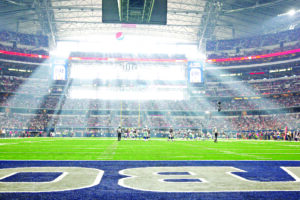By David Mullen
Squinting into the glaring sunshine radiating through the windows at AT&T Stadium, Dallas Cowboys wide receiver Cedrick Wilson looked befuddled as a pass from quarterback Dak Prescott headed his way. It was if he didn’t see what was coming. As the ball harmlessly bounced on the gridiron’s Matrix Turf — as in “The Matrix” — the truth was revealed.

Photo courtesy of Twitter/AT&T Stadium
The Cowboys were not ready.
The blinding light on the field — built in an east/west direction for “esthetic reasons” — would serve as a portent for the 2021 season. The sun beams came just a couple of hours before the sun set on the team’s playoff chances. For a variety of reasons, it was curtains for the Cowboys at their curtainless home.
Despite the expectations of fans, media members, players and senior management of a Dallas victory and a second-round game in Tampa, the 23-17 “Super” Wild Card game loss to the San Francisco 49ers on January 16 — like the sun — should have been in the forecast.
The Cowboys committed 14 penalties against the 49ers, after ending the season as the most penalized NFL team. What was most disturbing is that many of the penalties were caused by lack of focus from players and coaches. Questioning officiating is commonplace after a loss, but illegal motion, offside and encroachment penalties are not judgement calls like pass interference or roughing the passer.
Fans tossed trash at the officials after the loss as they left Jerry World. “Credit to them,” Prescott said of the fans after the game. He apologized for his comment two days later via Twitter.
The officials did not make the play call where Prescott would execute a quarterback run with 14 seconds and no time outs left in the game, run five yards too far and then fail to hand the ball to the referee for placement as required. The officials did not abandon the running game to run trick plays against an athletic defense. Time ran out on the Cowboys because of a dubious game plan and bad execution. Discredit to them. No apology to date.
After the game, head coach Mike McCarthy said the Cowboys practiced the game’s final play on a weekly basis and anticipated getting another snap. How is that possible? There were way too many variables. To compound matters, it was assumed that with one second left the Cowboys would have completed a touchdown pass from the 23-yard line, made the extra point, celebrated a 24-23 win and head to Green Bay for a second-round playoff game. Highly unlikely given recent history.
All season, McCarthy’s Cowboys seemed unprepared for better teams and demonstrated an inability to manage the play clock at the end of halves. A last second field goal against the Los Angeles Chargers in week two notwithstanding, in week one, the Cowboys gave Tampa Bay quarterback Tom Brady — who threw for four touchdowns and 379 yards — 1:24 to get the Buccaneers in field goal range for a win. He did, the kick sailed through the uprights and the Cowboys began the season 0-1. Dallas also had time management issues in losses to Las Vegas and Arizona.
The Cowboys finished the regular season 12-5. No denying that they were fun to watch, and it was enjoyable when they went 6-0 against other teams residing in the dreadful NFC East by a staggering 133-point differential.
But they were 1-4 in the regular season against playoff teams. By season’s end, their strength of schedule was 31st among 32 NFL teams. It may be fun to watch them beat up on weaker opponents but doesn’t bode well when reaching the playoffs because — surprise! — all the teams are playoff teams.
In week four, the Cowboys faced a healthy 3-0 Carolina Panthers. They won at home by jumping out to an early lead and rushing for 245 yards against a previously stingy Panthers run defense. In a home loss to Arizona, the Cowboys got down early and rushed for 45 yards. Against the 49ers, they again got behind early and ran for only 77 yards.
There has been no good explanation why McCarthy and offensive coordinator Kellen Moore tried to experiment in the playoff game versus the 49ers. They have a pricey Ezekiel Elliott and explosive Tony Pollard and should have tried to establish a run game despite an early 7-0 deficit. Instead, Elliott was ineffective, and Pollard got only four carries.
Dallas has some excellent players. Rookie linebacker Micah Parsons is already an All-Pro and the defensive future of the franchise. Trevon Diggs made the Pro Bowl thanks to 11 interceptions. Their defense was opportunistic, amassing 34 takeaways throughout the season. But they were 20th in passing yards allowed and 19th in total yards allowed in the NFL. There is still work to do.
On offense, Prescott is capable of brilliance. At 31, Zack Martin and Tryon Smith anchor the offensive line. They must address the Elliott situation, sign free agent tight end Daulton Schultz and punter Bryan Auger and decide whether Amari Cooper, his 865 receiving yards and eight TDs are worth $20 million next season.
Jerry — “I am owner of the Dallas Cowboys” — Jones runs the Cowboys like a family business. His children are part of the decision-making process. He is a brilliant marketer, but his grasp of Xs and Os may have eluded him. ”I will be part of every decision,” Jones said when he bought the team in 1989. “I won’t leave anything to the football people.” He hasn’t wavered. But after 26 seasons of missing the Super Bowl, Jones should hand the keys to “football people.” He just needs to find the right “people.”
Jones turns 80 in October. He will not see another Super Bowl for his beloved Cowboys until he can see the light, which should be easy. He just needs to look east toward the curtainless windows at his cherished Jerry World.
